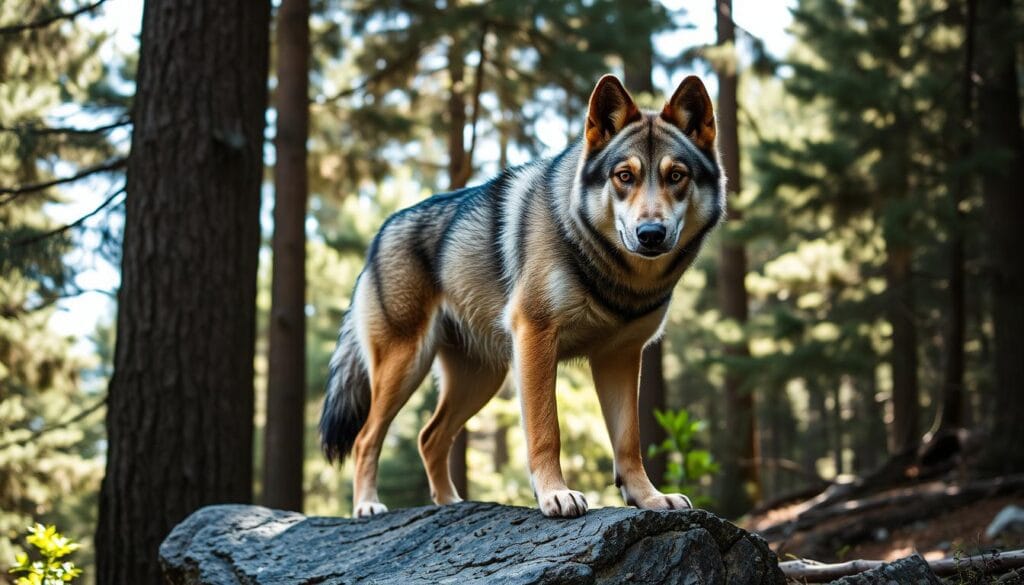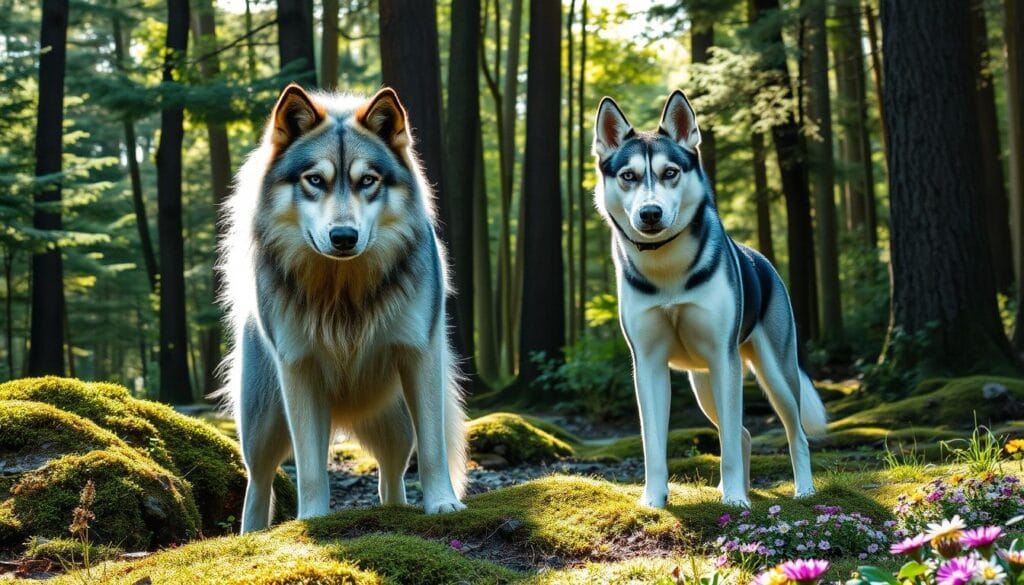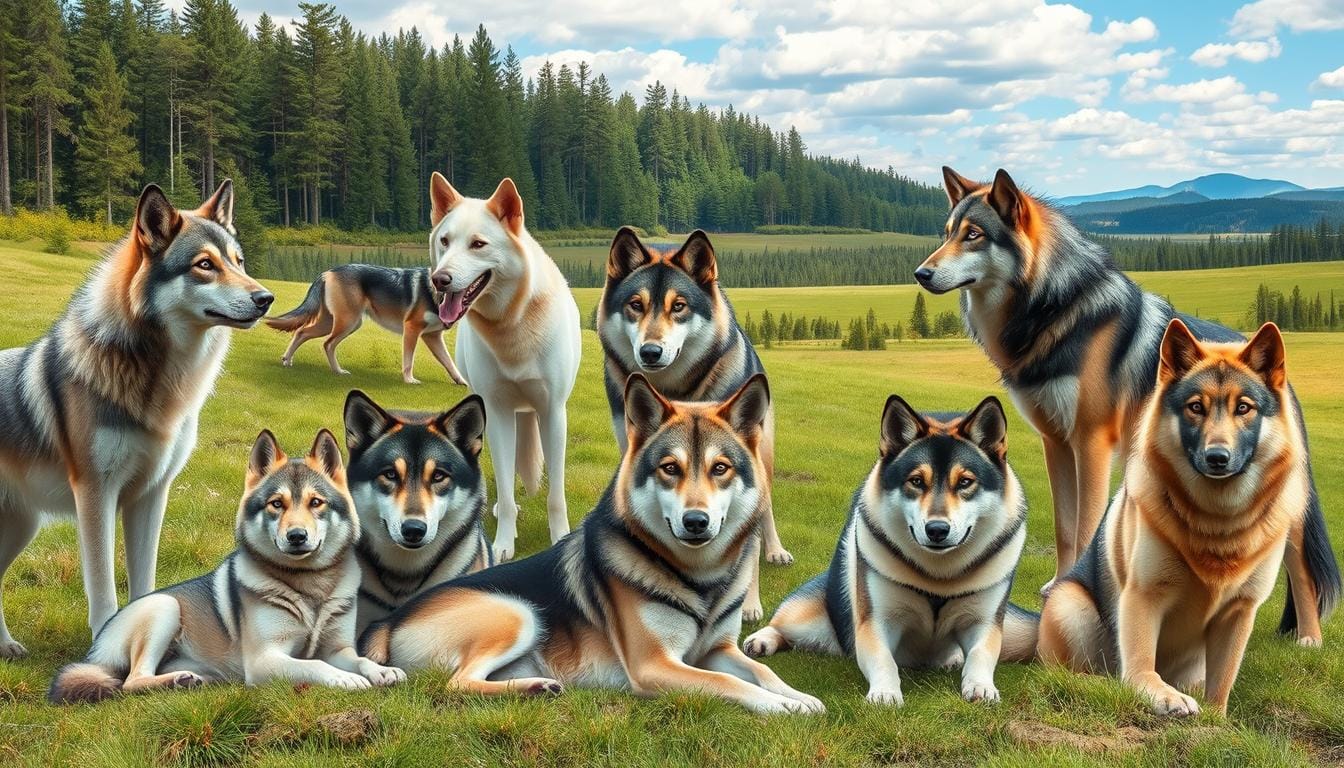Exploring Wolf Dog Breeds reveals their unique qualities as pets. These dogs, with their striking looks and loyalty, win many hearts. If you dream of living tiny with a wolf, knowing their needs is key. Wolf Mix Dogs, blending wild and tame traits, are a popular choice.
Wolf Dog Breeds are irresistible with their grand looks and smarts. They draw many to the idea of owning one. As I look into Wolf Mix Dogs, I see how vital it is to grasp their behavior and needs. Whether you’re new or experienced, embracing this journey with an open mind is essential.
Table of Contents
Introduction to Wolf Dog Breeds
Exploring the world of canine companions, I’m drawn to Low Content Wolfdog breeds. These dogs, with their wolf-like looks and behaviors, have won many hearts. Let’s dive into what makes them unique.
The history of wolf dogs is rich and varied. Breeds like the Czechoslovakian Wolfdog and the Saarloos Wolfdog stand out. They are known for their energy and strong hunting instincts.
What Are Wolf Dog Breeds?
Wolf dog breeds are dogs that look like wolves. They have thick fur, sharp eyes, and a strong body. They’re great for hunting, search and rescue, and as pets. Key traits include:
- High energy levels
- Strong prey drive
- Intelligence and trainability
- Loyalty and affection towards their owners
The History of Wolf Dogs
Wolf dogs have a long history, with roots in ancient civilizations like Egypt and Greece. Breeders have created many wolf dog breeds over time. Today, they’re sought after for their loyalty and smarts.
Wolf dog breeds are not just pets, they are a lifestyle. They require attention, exercise, and training, but the rewards are well worth it.
| Breed | Origin | Characteristics |
|---|---|---|
| Czechoslovakian Wolfdog | Czechoslovakia | High energy, strong prey drive, intelligent |
| Saarloos Wolfdog | Netherlands | Loyal, affectionate, strong instinct |
The Unique Traits of Wolf Dog Breeds
Exploring wolf dog breeds reveals their unique features. These dogs stand out with their striking looks. Their coats, eyes, and body shapes are just a few of their special traits.
Wolf dog breeds are smart, loyal, and full of energy. They need lots of exercise and mental games to stay happy. A Wolf Pup Drawing can help you understand their looks and behavior.
Some key traits of wolf dog breeds include:
- High energy levels, requiring regular exercise and mental stimulation
- Loyal and intelligent, making them great companions
- Distinctive physical features, such as coat patterns and eye colors
Wolf dog breeds are truly special. Their looks and personalities make them perfect companions. Whether you’re interested in learning about Wolf Like Dogs or creating a Wolf Pup Drawing, these breeds are captivating.
| Breed | Physical Characteristics | Temperament |
|---|---|---|
| Alaskan Malamute | Thick coat, muscular build | Loyal, energetic |
| Siberian Husky | Thick coat, blue eyes | Intelligent, outgoing |
Popular Wolf Dog Breeds
Exploring wolf dog breeds is fascinating. Each breed, like the Alaskan Malamute and Siberian Husky, has unique traits. The Czechoslovakian Wolfdog, or Czech Wolfdog, is also popular. Its striking looks and smart nature attract many.
Some well-known wolf dog breeds are:
- Alaskan Malamute: known for its strength and endurance
- Siberian Husky: recognized for its speed and agility
- Czechoslovakian Wolfdog: prized for its intelligence and loyalty
- Tamaskan Dog: admired for its friendly and outgoing personality
Black Wolfdogs need special care. With the right attention, they can be wonderful pets. The Czech Wolfdog, in particular, needs early training and socialization.

In conclusion, each wolf dog breed is unique. Knowing their traits helps owners choose the right one. Whether you prefer a Black Wolfdog or a Czech Wolfdog, proper care and training are key for a happy pet.
| Breed | Origin | Temperament |
|---|---|---|
| Alaskan Malamute | Alaska | Strong-willed and independent |
| Siberian Husky | Siberia | Outgoing and friendly |
| Czechoslovakian Wolfdog | Czechoslovakia | Intelligent and loyal |
| Tamaskan Dog | Finland | Friendly and outgoing |
Considerations Before Adopting a Wolf Dog
Exploring Wolf Dog Breeds shows that adopting one is a big decision. Before getting a Wolf Breed Dog, it’s key to learn about the laws and rules. This helps avoid any problems.
Some places have special rules for owning Wolf Dog Breeds. Knowing these laws is important. Also, Wolf Breed Dogs need lots of space and a safe place to live. They must have room to run and play, and their home should be secure.
Legal Issues and Regulations
Legal matters for Wolf Dog Breeds differ by location. It’s important to check with local authorities. They can tell you about any laws or rules for owning Wolf Breed Dogs in your area.
Space and Environment Requirements
Wolf Breed Dogs are very active and need lots of space. They need a big, safe area for exercise and play. Their home should also meet their needs. Here are some important things to consider:
- A large, fenced-in area for exercise and play
- A secure, escape-proof enclosure to prevent escape
- A comfortable and spacious living area with adequate shelter and bedding
By thinking about these points and doing your homework, you can make a great home for your Wolf Breed Dog. This will lead to a happy and fulfilling time with your Wolf Dog Breeds.
Health Concerns in Wolf Dog Breeds
If you’re thinking about getting a Wolf Mix Dog, knowing about health issues is key. Regular vet visits are important to catch problems early. WebMD says these dogs can face health problems because of their genetics.
Wolf Mix Dogs might get hip dysplasia, eye problems, or allergies. It’s important to choose a good breeder who cares about their dogs’ health. Low Content Wolfdog owners should watch out for inherited health problems and try to avoid them.
Common Health Issues
Wolf Mix Dogs can also get health problems from their wild roots. They might get parasites or infections more easily. Exotic Pet Haven says it’s important to keep up with vet care and prevent problems.
Regular Veterinary Care
Keeping your Wolf Mix Dog healthy means regular vet visits. This includes check-ups, shots, and stuff like heartworm meds and flea control. Taking care of your dog’s health can prevent problems and make their life longer and happier.
Training Your Wolf Dog
As a owner of Dogs That Look Like Wolves, training and socialization are key. Wolf Like Dogs need early socialization to behave well, be less aggressive, and feel more confident. Positive reinforcement, clicker training, and obedience training help a lot.
Effective training for Wolf Like Dogs includes targeting and stationing. These methods help them focus and learn commands. Building trust is also vital. You can do this with crate training and regular interaction.

For more info on training Wolf Like Dogs, check out working with wolves. Experienced trainers share their knowledge there. With time and effort, you and your Wolf Dog can have a strong bond and a fulfilling relationship.
Training your Wolf Dog has many benefits:
- Improved behavior and reduced aggression
- Increased confidence and trust
- Enhanced communication and understanding
Living with a Wolf Dog
As a wolf dog owner, it’s key to know what your pet needs every day. A good diet, regular exercise, and mental play are vital. A Wolf Pup Drawing can help you see how your pet grows from a puppy to an adult.
It’s important to make your home safe for your wolf dog. This means having strong fences, a cozy shelter, and lots of room to move around. A Black Wolfdog needs lots of activity, like walks and playtime, to stay happy and healthy. Here are some tips to keep in mind:
- Give your wolf dog a balanced diet that fits their nutritional needs
- Make sure they have a safe and comfy place to live with good fencing and shelter
- Keep them active and mentally stimulated to avoid boredom and stress
By following these tips, you can make a happy and healthy home for your wolf dog. Always put your pet’s needs first and give them the care and love they deserve. This will help you build a strong and loving bond.
With the right care, your wolf dog can be a loving part of your family. Whether it’s a Black Wolfdog or another breed, knowing their special needs is key. This ensures they live a happy and healthy life.
| Wolf Dog Breed | Daily Exercise Needs | Mental Stimulation Needs |
|---|---|---|
| Black Wolfdog | 2 hours of exercise per day | Regular playtime and training sessions |
| Other Breeds | 1-2 hours of exercise per day | Regular playtime and mental stimulation activities |
Myths and Facts About Wolf Dog Breeds
Exploring wolf dog breeds, I’ve found many false beliefs about them. One myth is that all wolf dog breeds, like the Czech Wolfdog, are always aggressive because of their wild roots. But this is not true. With the right training, socialization, and care, wolf dog breeds can be loving and faithful friends.
It’s important to understand wolf dog breeds’ behavior to clear up these myths. For example, wolf dog breeds love to be in packs and are very social. The Czech Wolfdog, in particular, forms a strong bond with its family. It’s a great fit for an active home. By knowing and valuing wolf dog breeds’ special traits, we can fight common myths and help people understand these amazing animals better.
- They are highly intelligent and responsive to training
- They need regular exercise and mental challenges to avoid boredom and bad behavior
- They are usually loyal and loving with their families but might be cautious around strangers
By accepting the truth about wolf dog breeds and their unique qualities, we can grow to appreciate and respect them more. This will help us build a better relationship with these incredible animals.
Conclusion
As we wrap up our look into wolf dog breeds, think about if they’re right for you. These dogs are smart, loyal, and love nature. But, they also bring big responsibilities and challenges.
Are Wolf Dogs Right for You?
Having a wolf dog means you must understand their needs well. You’ll need to train and socialize them a lot. It’s also important to give them a safe and fun place to live.
Deciding to get a wolf dog is a big choice. You’ll need to do a lot of research and be ready for legal issues.
Final Thoughts on Choosing a Wolf Dog
If you’re drawn to wolf dogs and think you can give them what they need, they might change your life. But, you must carefully consider the good and bad sides. Make sure you can handle the special needs of a wolf dog.
With hard work and the right preparation, you can create a deep bond with these amazing animals. It can be life-changing.

